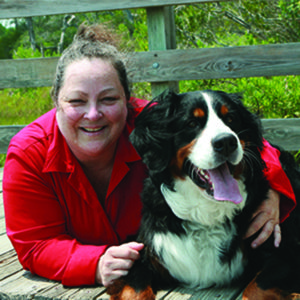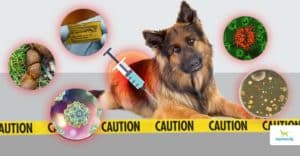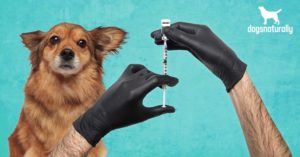Can dogs have autism? You might wonder sometimes, if you see unusual behaviors in your dog. You might not even be serious when you laughingly say “I think my dog’s autistic.” But you should consider the real likelihood that you’re right.
Researchers have asked the question “can dogs have autism?” for some time.
In fact, at the 2015 American College of Veterinary Behaviorists … Dr Nicholas Dodman presented a report on tail-chasing behavior in Bull Terriers. He speculated that this syndrome has features in common with autism in humans.
So, if you think your dog might have autism, you could easily be right. But you might not realize the possible causes … or that you can do something about it.
Conventional and holistic vets have differing views on canine autism, too.
What Is Autism?
Most people are familiar with autism in humans. It’s a spectrum of disorders with a range of mild to severe behaviors or pathologies. The autism spectrum includes milder diseases, like Asperger’s Syndrome.
The Mayo Clinic says the autism spectrum often involves difficulties in social interaction. And it can cause restricted, repetitive patterns of behavior, interests or activities. Typical behaviors include …
- Being overly distressed when anxious or fearful
- Anxiety tantrums (sometimes violent)
- Hypersensitivity to sound
- Damage to nervesInability to taste or smell food
- Eating disorders
- Gastrointestinal problems
- Loss of recognition or engagement with family or household members.
People with autism spectrum disorders may have difficulties learning. They may even regress, losing previous achievements or milestones. Children often experience a delay in developing motor skills. People with disorders on the autism spectrum may be hyper-responsive or aggressive. They may fear strangers as well as change.
Autism can also involve obsessive-compulsive repetitive habits. It may include avoiding eye contact and difficulties with social recognition or interaction. Autistic people may have an aversion to being touched or restrained.
If some of these behaviors are things you’ve noticed in your dog … it’s certainly possible he has a kind of autism.
Autism In Dogs
Autism in dogs is a complex topic.
Your vet may not take the idea seriously. But some conventional veterinary behaviorists do recognize autism in dogs.
Autism can be tentatively diagnosed in dogs when they show …
- Atypical repetitive behavior
- Some degree of impaired social interaction (with dogs or people)
I mentioned earlier that veterinary behaviorists have studied tail-chasing behavior in Bull Terriers. Initially, researchers labeled the tail-chasing as a compulsive disorder.
But Dr Dodman noticed other common behaviors in these dogs. Many of them, especially males, showed explosive aggression. The dogs were also prone to seizures. Others stared at walls or into space. They would freeze under bushes or walk in slow motion.
Research On Autism In Dogs
The 2011 study observed specific traits and DNA analysis of 132 Bull Terriers. There were 55 tail-chasing dogs and 77 control (non tail-chasing) dogs.
They found that tail chasing is …
- More prevalent in males
- Associated with trancelike behavior
- Linked to episodic violent and explosive aggression
The researchers concluded that obsessive tail chasing could be a canine form of autism. When they followed up on the study, they learned the dogs’ owners considered them asocial. And the dogs had profound fixation or obsession with objects. These are both features of autism.
But scientific journals disagreed and refused to publish the paper. So the researchers followed up with a more in-depth study.
Additional Analysis
They looked at two biomarkers used in human autism:
- NT – the peptide neurotensin
- CRH – a corticotrophin releasing hormone
When they tested some of the Bull Terriers, they found the levels of NT and CRH were high in the tail-chasing dogs. With this information they were able to get their research published.
The research also showed canine autism responded to similar medications as humans. These were serotonin-reuptake inhibitors (like Prozac), and anticonvulsant drugs. Many of the dogs also had skin and GI issues … common in people with autism.
The researchers continue to investigate the genetics involved in canine autism and OCD disorders.
But that’s the conventional view … that it’s mostly a genetic problem.
So … it’s good that some conventional practitioners acknowledge dogs can have autism. But are they missing the elephant in the room?
And by that I mean vaccination. Most holistic veterinarians recognize over-vaccination as a trigger for autism-like behaviors in dogs.
Vaccination And Canine Autism
Despite the conventional view … autism is never just limited to genetic susceptibility. There are other internal factors that influence gene expression.
One major impact is neuroinflammation … leading to a loss of functional connectivity in the brain. Significant gastrointestinal inflammation can also be a factor. But the greatest impact to the internal environment and inflammation of the brain is vaccinations.
A perfect example is veterinarian Dr PJ Broadfoot’s book … Vaccination – A Literature Review and Possible Therapeuticsfor Vaccinososis. In conversation with me, Dr Broadfoot maintained that …
“I absolutely believe that any patient can be vaccine-damaged and exhibit autistic characteristics. There are many mitigating factors, including genetics and microbiome disruption (antibiotics, glyphosate, etc). They certainly showed damage in monkeys, post vaccine.”
A study in baby rhesus macaques showed that only the vaccinated baby monkeys regressed after vaccinations. Non-vaccinated monkeys did not. This was one of many studies showing the vaccination schedule for children causes regression in primates.
And contaminants in vaccines make vaccination an even bigger problem.
Contaminants Contribute To Autism
There are two harmful types of contaminants in vaccines that likely trigger autism.
MIT researcher Dr Stephanie Seneff has spoken out about the link between glyphosate and the incidence of autism in humans. She’s revealed how inescapable glyphosate is in our environment. And it’s being fed to animals so that our food supply is contaminated. And so, as it turns out, are the vaccines.
Glyphosate
Because glyphosate is in the animals, it becomes a part of the collagen and gelatin used in vaccine manufacture. And glyphosate can multiply the effects of other toxins. Mercury is just one example.
Metals
It’s no secret that mercury poisoning causes neurological and endocrine system problems (among others). And studies show testosterone makes mercury much more toxic. (This likely explains why autism is 4 times more common in boys). But in the face of glyphosate, mercury toxicity is 1000 times greater.
RELATED: Mercury poisoning in dogs …
Heavy metals and metals in general are still very much a part of vaccine production. In a 2017 study, the vaccines examined all contained metals beyond the mercury or aluminum previously identified. Nanoparticles of many metals … from antimony to zirconium … were found in the vaccines.
Industrial pollution in the environment concentrated these metals in the water supply. And the water was then used in the vaccine manufacturing process. Even these nanoparticles of metals could induce inflammation in the body and brain, causing neuroinflammation.
The Official Story
The medical “establishment” refuses to acknowledge that vaccines can trigger autism. The CDC continues to assert that studies show no link between vaccines and autism. Despite other credible research, they dismiss studies that disagree with them … saying they’re incomplete or unacceptable.
Interestingly, the CDC does recognize a link between other drugs and autism. They’ve stated that mothers taking opioids before or during pregnancy increases the risk of autism.
But most holistic practitioners clearly see the vaccination-autism connection. And the same is true in the veterinary world.
Tragically, many parents of autistic children are only too well aware of the events that triggered their child’s disease.
But for dog owners, it’s not quite as clear. And for dogs, it can be deadly.
Behavioral Issues Can Mean Death To Dogs
Autism in humans is a tragedy, but it isn’t a death sentence. But autism in dogs can often be fatal when dogs develop behavioral issues and become unadoptable.
Many animals are surrendered to animal shelters because of behavioral disorders. And many are put to death every year because of these same behavioral disorders.
Vaccination to prevent disease is common in our society . And so … behavioral issues from neuroinflammation due to vaccination are common too. My veterinary colleagues and I all see dogs with behavioral problems that developed after vaccination.
RELATED: Rabies vaccines and aggression in dogs …
A Dog With Autism
Take this example of a rescue from California. She was given up on by a couple of well-intended adoptive families.
- She’s destructive.
- She has separation anxiety.
- She’s noisy, and chirp-barks (actually the owner reported that she “screams”)
- She has anxiety triggers and temper tantrums.
- She’s hyperactive.
- She doesn’t know how to play.
- She appears to be untrainable.
- It’s hard to get her to focus.
- She has obsessive-compulsive disorder behaviors. One example is licking the bowl long after the food is gone. She even licks the floor after the bowl is gone.
Taken together, this appears to be full-blown autism.
Lack Of Evidence To Support Vaccination
The risks of injecting anything into anyone are clear. And in dogs, there’s no scientific testing to support why we’re vaccinating … or the safety and efficacy of what we are injecting.
There’s no doubt that autism spectrum disorder is a very complex topic. There are many factors, such as …
- Malnutrition
- Genetic alterations
- Vaccines
- Viruses
- Metals
- Genetically engineered or modified substances
- Toxic chemicals and drugs
- Possibly electromagnetic radiation
These things are all changing the landscape of autism disorder. Environmental toxicity is certainly a part of the problem. But never, ever underestimate the power of the internal toxicity via vaccinations.
Rabies vaccines are especially harmful. And because of legal requirements, most dogs get far too many of them. Rabies vaccination can cause rabies-like symptoms that often include behavioral problems.
RELATED: 65 ways rabies vaccination can harm your dog …
Managing Autism Symptoms
If you think your dog has autism, there are many things that can help. And you don’t have to resort to drugs like Prozac.
Your holistic vet can guide you in the best approach for your dog’s individual symptoms. Developing a basic foundation for good health is key … so your vet may suggest things like …
- Heavy metal chelation or detox
- Organic and whole food nutrition
- Intelligent whole food supplementation
And of course, stopping all vaccinations is essential for a vaccine-damaged dog. So you’ll need to find a vet who supports you in your vaccine-free approach.
Dog owners often assume that behavior is just a training issue. And so do dog trainers. It takes a very knowledgeable trainer to recognize that there’s often a medical reason for behavior problems. And few know that homeopathy offers solutions.
Homeopathy Helps
More than 150 years ago, early homeopathic greats like Dr J Compton Burnett identified the most important remedies for the malady “never well since vaccination.”
Homeopathy has a long, highly successful track record of healing vaccine-damaged patients. Well-chosen remedies can relieve the mental, emotional and physical problems stemming from vaccination.
But there’s no single remedy that works for every dog. So you’ll need a professional homeopath to analyze your dog’s unique case and prescribe the right remedies.
If your dog develops any chronic health issues after vaccination, I strongly encourage you to ask a homeopath for help. You can find one at theavh.org. Most will do phone consults … so they don’t have to be local.
Don’t give up on your dog if you think he has autism! Many dogs can recover from autism-like behaviors triggered by vaccination.
References
Moon-Fanelli AA, Dodman NH, Famula TR, Cottam N. Characteristics of compulsive tail chasing and associated risk factors in Bull Terriers. J Am Vet Med Assoc. 2011 Apr 1;238(7):883-9.
Tsilioni, I., Dodman, N., Petra, A. et al. Elevated serum neurotensin and CRH levels in children with autistic spectrum disorders and tail-chasing Bull Terriers with a phenotype similar to autism. Transl Psychiatry 4, e466 (2014).
PJ Broadfoot DVM. Vaccination – A Literature Review And Possible Therapeutics For Vaccinosis. JAHVMA, Vol 46, Spring Issue 2017.
Hewitson L et al. Influence of pediatric vaccines on amygdala growth and opioid ligand binding in rhesus macaque infants: A pilot study. Acta Neurobiol Exp (Wars). 2010;70(2):147-64.
Beecham, James & Seneff, Stephanie. (2016). Is there a link between autism and glyphosate-formulated herbicides?Journal of Autism. 3. 1. 10.7243/2054-992X-3-1.
Haley, Boyd. (2005). Mercury toxicity: Genetic susceptibility and synergistic effects. Medical Veritas: The Journal of Medical Truth. 2. 535-542. 10.1588/medver.2005.02.00070.
Gatti, Antonietta. (2017). New Quality-Control Investigations on Vaccines: Micro- and Nanocontamination. International Journal of Vaccines & Vaccination. 4. 10.15406/ijvv.2017.04.00072.















